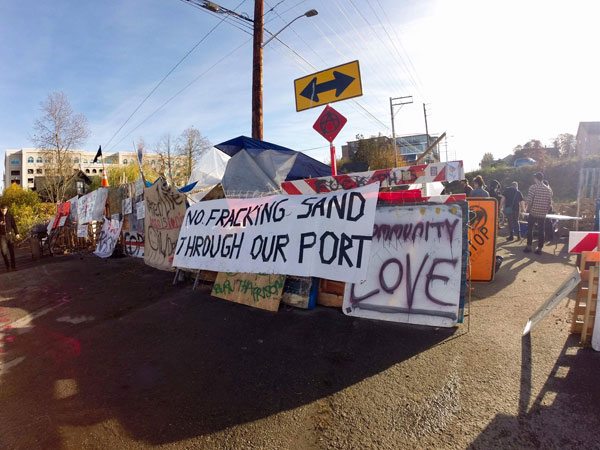
November 29, 2017; The Olympian
Over one thousand miles from the Bakken oil sands in North Dakota, protestors in Olympia, Washington took a stand to protect the region from fracking by blocking the train tracks by which ceramic proppants—a substance used in the fracking process—are shipped.
The Olympia Stand protest, which was inspired by the Standing Rock protest in North Dakota, is a repeat of a similar protest in the same spot at the same time last year. Twelve people were arrested at the site in 2016, but no arrests have been reported so far since this year’s camp was raided early Wednesday morning. According to the Washington Post, “the 2017 blockade [was] composed of a much more diverse range of players, from indigenous activists to anarchists to Libertarian Socialists.”
Several stakeholders had different end goals in mind for this protest. Kyle Taylor Lucas, an indigenous rights activist, told the Post, “What we are trying to do is resist the forced complicity in this brutal practice to devastate the earth. The various affinity groups here bring their own specific messages and commitments and specific reasons for being here. But we came together for the common demands.”
Leaders on the other side of the debate were less unified. J. Bradley Ovitt, the president of the railroad company, wrote a letter to the city, “request[ing] the City and its police force fulfill the request by Union Pacific Railroad for assistance in removing the illegal trespassers off of the rail line to the Port of Olympia.” City Manager Steve Hall told The Olympian, “Their beef is really with the port, not with the city.” Olympia Mayor Cheryl Selby said, “There is reason to suspect that the blockade protesters are neither interested in negotiating nor in an amicable resolution that would result in removing the blockade without force.” Perhaps most memorably, Olympia Police Chief Ronnie Roberts told The Olympian, “I have spent the last five years empowering our department to build trust and build relationships with our community. I don’t want to lose those efforts. It angers me to have to put our officers in combat gear and face off with members in our community over something I don’t believe in myself.”
Sign up for our free newsletters
Subscribe to NPQ's newsletters to have our top stories delivered directly to your inbox.
By signing up, you agree to our privacy policy and terms of use, and to receive messages from NPQ and our partners.
On a positive note, Lucas told the Post that “I should note how uplifting it was for we indigenous women to hear all the young ones make strong and unequivocal statements in solidarity with us.” She also noted that the shipments “cross both indigenous traditional land and treaty land, are another instance of the government making decisions about land use without consulting indigenous peoples.”
Since the protests at Standing Rock, environmental and other concerns held by indigenous peoples in the US have gotten more attention, as NPQ has observed (although American Indians continue to receive limited press coverage). Still, in relation to another, more successful protest in Olympia this week, activist Matt Remle noted,
The efforts coming out of the Northwest demonstrate that you can successfully merge the concerns of [American Indians] with environmentalists and local jurisdictions to craft successful campaigns to halt these treaty-breaking, environmentally destruction fossil fuel projects. It can be exhausting, but is absolutely critically, to be engaged in every step pf the process to combat the fossil fuel industry.
The crucial question to ask is, how can we make the bigger conversation happen? If the same protest is happening in the same place, for the same reasons, two years in a row, is there a way to bring the interested parties to the table to prevent a 2018 repeat? The Port of Olympia is a key access point for various fossil fuel sites in the US and Canada, and also, it seems, an active center of protest efforts, so perhaps this is a good place to start these types of conversations. The increased visibility of Native environmental concerns is a starting point, but it’s not yet enough, and communities have a responsibility to get to a place where these activists have an equal voice at the table.—Erin Rubin













